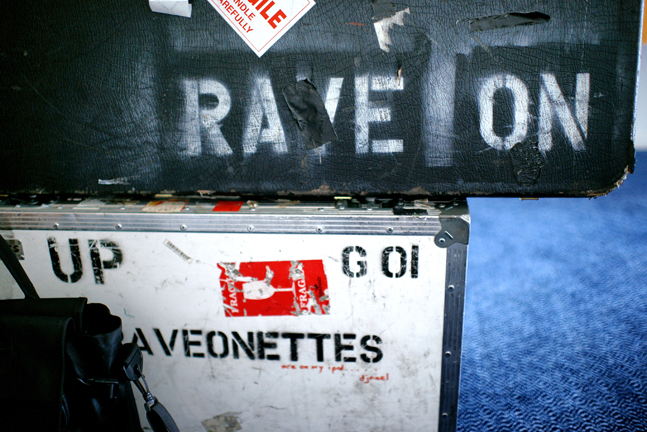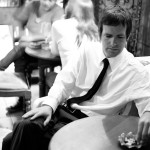[Portraits by Jen Maler; Live Shots by Andrew Parks]
Words by Michael Tedder
When self-titled selected The Raveonettes as our first “You Can’t Ask That” interview (the literal declaration of five topics we absolutely cannot discuss), we figured Sharin Foo and Sune Rose Wagner would ban questions about distortion pedals, the Jesus and Mary Chain and who, exactly, Aly is. So you can imagine our surprise when we received the official list–a moratorium on the Music Journalism 101.
Here it is, straight from their manager’s laptop:
- How did you meet?
- Give me a little background.
- Describe your sound.
- What can the audience expect from the show tonight?
- How is this album different from the previous one?
While it was difficult to conduct an interview without resorting to the most inane questions possible, s/t tried to ask Wagner about The Raveonettes’ new record (In and Out of Control, out now on Vice), the band’s growing popularity back home, and what he really wants for Christmas.
“Some people started writing, ‘The Raveonettes need help'”
Do you still get a lot of questions about how you guys met?
Yeah, a lot.
Wow. Even, like, six years after your first album came out?
I know. It sucks.
Jeez, I’m sorry. Is it all daily newspaper critics and people who clearly don’t know who the band is?
You know what I think it is? People always think it’s funnier when you tell the story, you know what I mean? They can read about it or they can see it in a press statement, but I think they like to hear you say it. I think that’s just what it is.
So you’ve been on a real productive streak recently. You’ve had two albums in two years, plus three EPs. What’s behind the onset of productivity?
I think it’s because we didn’t really tour that much with [the 2007 album] Lust Lust Lust, so we had a bunch of time, and I like writing songs and recording music, so it was just a natural thing for me, I guess. I hope we can release another album next year, but right now it’s looking a little tough because we have a lot of touring coming up. But as soon as we have a couple weeks off, I’ll definitely start writing and recording again. I love it, I have a need. I can’t stop.
Are you a song a day type of guy like Rob Pollard?
I’m usually four songs a day.
Whoa.
Four, maybe five songs even. When I’m on a good roll that’s usually what I’ll do. I get up early in the morning and I’ll work until five or six or so.
With this album, you talked to your fans via Twitter during the recording process. (The group would post links to in-progress songs.) How did that go?
It was a little bit misunderstood, I think. We invited them into the making of the album, but it didn’t necessarily mean that they had something to say about it. They’re more than welcome to comment on it–and I always read the comments; I think they’re funny–but I don’t really change anything because of it. But the press:some people started writing, ‘The Raveonettes need help, they need you to help them with the new album,’ which was definitely not the case.
I think it’s important to get your fans involved with what you’re doing, to get them excited. And if you don’t like that type of thing, if you want to keep it more mysterious, you don’t have to read the blogs, but some people really like that, so it’s for them.
Did you get any surprising feedback? Was it all along the lines of ‘dude this song is awesome’, or were there specific comments like ‘maybe you should change the key during the chorus’?
There was a lot of that–a lot of really specific things. There was someone who wrote a long, long thing about ‘you know when it goes into the second verse in the second bar I think the guitar is a little bit too blah blah.’
Sometimes the problem with putting out demos or rough mixes is that people get really attached to them. They hear the final product, and they miss that initial song that they heard when it was being made because they fall in love with it. And I know it myself–you always fall in love with demos, and the demos are extremely hard to then turn into full-fledged songs. So that’s why we stopped making demos. The stuff that we posted were not demos. They were basically a song in progress, so to speak. So some people would say ‘I like the demo a lot better’. Me too. I know what they mean, but I’m not in state where I only listen to one thing and get attached to that, I’m in the middle of a process.
Did you ever feel ‘well, we can’t change too much now’ because people have heard it?
No!
You’ll keep rewriting?
We’ll keep rewriting until the end, until we know that we have something that we like. I think that’s the fun part–if you hear a song with a little bit of different melody even or lyrics or something, and you hear the final and it’s completely changed. That’s really what it’s supposed to be like, so you can actually see the progress. But I don’t think we had any major, crazy, big changes. There was a little bit of a sound thing, and there was an initial song that we released that didn’t end up on the album, and it became a b-side instead and some people were like ‘why didn’t that song make it on, it was so good’ but you have so many songs. It’s the same thing when you play live, people will always say to you ‘why you didn’t play that song,’ but we have a hundred songs to choose from, you just can’t play them all.
“It was almost comical at times. Like, ‘Why are we playing MTV Spring Break in front of 200 college kids who are pumping iron on the beach?'”
Speaking of live shows, I saw you play the Village Voice’s Siren Festival last summer. It was a great set, but it was weird to see you guys play in daylight:
Yeah [Laughs]
:because of how noir you normally are.
Yeah, we had that problem at Lollapalooza, too.
Does it take a lot of arm-twisting for you to do these things? Or do you not mind that much?
We totally mind, but I also realize that a lot of people don’t mind it, and a lot of people want to see us live, so we’re also doing it for them…I really don’t think it fits the music very well either, and I think there are so many other bands on the bill that can easily do it, so I don’t know why we have sometimes been put on like that. That’s just how it is sometimes, I guess.
So you’re on your second album for Vice. How does working with them compare to all those years on Columbia?
It’s been a lot more personal, I would say. But I think it’s more because after Columbia, Sharin and I were like “well, we’ve really got to be in control of our own stuff. We don’t want anyone to make any decisions for us, we want to approve everything.†And Vice were totally cool with that, that’s how they work too. So it made things a lot easier. But it does mean that we do have a lot of business to take care of. There’s a lot of E-mailing back and forth, every single day, so it’s hard work.
When you decide to go from a major to an indie, is there a part of you that thinks “well, I guess we’re never going to be super famous stars.†Was it a tough decision? Did you think about going to another major, or were you just sick of it?
Well, there’s different answers to that question because it’s also different territories that we’re in. Very different. Like, we’re on Universal in Denmark, which is probably the biggest record company in the world, but the reason we’re on Universal in Denmark is because we wanted this really good radio plugger–who we knew was going to be able to get our songs on the radio, finally. He happened to be working with Universal at the time, so we signed the deal with Universal because we wanted him. He could have worked for any label, and it wouldn’t have made any difference to us. We just wanted him. And it worked–we had a number one song, our first number one ever.
Over here, it’s different. It’s such a big country and there’s so many radio stations, and different categories of radio stations, it’s impossible to keep track of, almost. But we never thought about it. On the other hand, we always thought that Columbia were hyping us too much in the beginning, to be the next big thing. And we could never really understand. Seriously, sometimes I think they expected us to be the new Coldplay or the new U2 or something, and it was such an overrated experience. It was almost comical at times. Like, “Why are we playing MTV Spring Break in front of 200 college kids who are pumping iron on the beach?â€
They have no clue who we are, they hate us, and we did all these terrible things sometimes that were totally wrong for us, instead of focusing on the people or the demographics where we belonged. So I think Vice has a better understanding of where we’re at. We’re not Kings Of Leon. That doesn’t mean that maybe at one point we can’t advance and do two sellouts at Terminal 5 (ed. note: a three-story New York night club and one of the biggest concert venues in New York City) or something. But until then, we’ll do what we do and keep it real.
“I always wanted to do a David Lynch movie…a Twin Peaks kinda vibe.”
When you first came out there were all those ‘The’ bands–The Strokes, The White Stripes–with the so-called ‘garage rock sound’. Seven years later, there’s a lot of bands that fell by the wayside, but you’re still here. That must be a nice feeling.
I think part of it has to do with the type of music that we play. The White Stripes, they play a cool type of garage mixed with very traditional American blues kind of thing, and it’s so deeply rooted that people get it. I think the things that we do, which is deeply rooted in ‘50s and ‘60s rock ‘n’ roll, is also so implanted in people’s brains that it won’t ever go out of style. Both influences are very traditional, but we’re doing it in our way, and we’re doing it now, as opposed to being a retro band. We try to progress every time, and try not to make the same album. I think it’s great that we can make such diverse albums and people still like it. We’ve either been extremely talented or extremely lucky to make albums that continuously intrigue people. We can make an album like [2005’s] Pretty In Black, which is a great little pop album, and then we can make a really noisy album like Lust Lust Lust and go on Letterman and play “Aly, Walk With Me,” which really has no chorus, no nothing, just a bunch of noise and one simple bass line. And now we can do In and Out of Control, which is extremely different again, and people like it. I think we’re very fortunate that we can do different albums and people will stick with us.
Going back to what you said earlier, what was your No. 1 hit in Denmark?
“Last Dance,†from the new album.
Was it satisfying to break through over there?
Yeah, it was great. Traditionally in Denmark, we had 15-percent of all the radio stations playing The Raveonettes, which is not a lot, but in Denmark it’s okay, whatever. But on this album we had 89-percent. So, it was a huge difference, and we could totally feel it, to.
Are you starting to get more recognized over there?
Yeah, but we have been for a long time. You got to understand, when we broke through over here, every little thing that we would do would be something that no other Danish bands had ever done before. Every time we do a Conan show or a Letterman show or tour with Depeche Mode, they would write about it like crazy. So all of a sudden we were this big celebrity that was doing all of these things that no other Danish band had ever done. We had a lot of respect back there, which is more what I am into. The celebrity thing I don’t care for, but I think it’s great when people come up and say “I really have respect for you guys, you believed in yourself, you left the country.â€
It’s very hard for Danish bands to leave, because Denmark is a very wealthy country. It’s a very safe country. We have free health care, free education, everything. There are no bums on the street, there are no homeless people, because it’s impossible. You can just go up to government and say “I need some money†or “I need a place to stay†and well, here’s an apartment. So, same thing with bands, you get paid extremely well there. You can make a really nice living, not even as a known band. And we were just completely the opposite, we’re not interested in getting all the freebies, we want to sit in a dirty van, we want to sit in a club and make $50 a night and play in front of 10 people, because we just thought it would be so much more inspiring and exciting to create beautiful music and work our way up. That was the whole idea, trying to get to another level.
So even when you were playing in some small town in America to 10 people, you still didn’t mind?
No, it was all part of the whole idea of building a fanbase, writing better albums, and being a better live band. It was all part of it. We knew we weren’t very good back when we played in front of 10 people. That’s why there was only 10 people–we played shitty, and that’s why there were only maybe 20 people the next time. But then we became better and better, and then there was 200, and then it was sold out. It was part of the whole thing. We’ll get there, we just have to work hard for it.
People often talk about your music as being cinematic. If you could pick any living film director to collaborate with, who would it be?
There’s three just off the top of my head. I always wanted to do a David Lynch movie, but not any movie. I don’t want to do one of the crazy strange ones that he sometimes does, but more a Twin Peaks kinda vibe. I always thought Tim Burton would be extremely interesting, even though he is a little bit more Gothic than maybe our music is. And the one that I really thought would be amazing, is if John Waters ever wanted to do a Christmas movie, I think that we could write a seriously good soundtrack to that. I think it could be really great.
I’m going to go see John Waters’ Christmas With John Waters thing. There’s a little meet-and-greet beforehand where you can chat with him, so I am going to suggest it and bring some CDs.
Will you bring your Christmas CD (Wishing You a Rave Christmas)?
Yeah, I’ll probably bring everything that we’ve done, in case he doesn’t have it. We played the Carson Daly show once, where he was the guest and we were the music, but he had to leave right when we were coming onstage. Otherwise that would have been a good introduction.
So, are you competitive with other bands?
I sometimes think, ‘Why the hell is that band playing a bigger place than we are?’, or ‘Why are they sold out? We didn’t sell out?’. It’s a healthy, competitive feeling. You need to be a little on edge sometimes to get the adrenaline running. Otherwise it’s just going to be a little boring, I think.
I’m only competitive if I think a band is not very good, in my opinion. I would never slag anyone off or anything, because I don’t think it serves a purpose.
You guys are known for your harmonies, and you talked about your ’50s and ’60s influence. When you’re writing your harmonies, are there any songs you use as guideposts to make sure you’re going in the right direction?
Well, it depends on what type of song it is, because there’s so many different ways of doing it. I think we pretty much found our own unique way now, because we go for certain notes and certain simplicity that I don’t really hear other people do. Initially I was very inspired by the Everly Brothers and Simon & Garfunkel, because I think that’s where it all lies. But if you listen to their harmonies, they can be quite intricate, and quite difficult, and we always wanted to do music that was a lot more simple. It’s more like if the Everly Brothers were covering a song by Suicide, what would they make it sound like? They would have to make it a lot more simple. So that’s what we aimed for, that in-between sort of thing.








